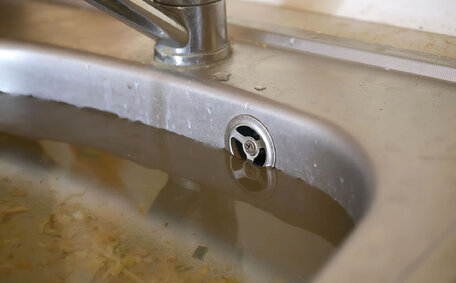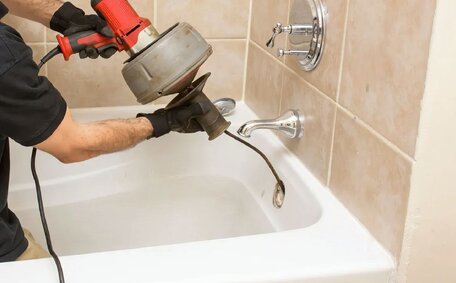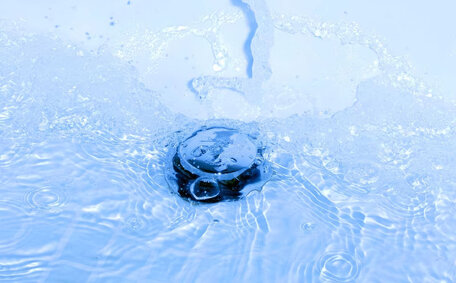Common Causes of Sewer Line Blockages
Functional main sewer lines are essential for waste removal from homes and businesses. Blocked drains lead to backups that disrupt your home’s plumbing. Common causes of blocked sewer lines include:
- Foreign objects - Toys, wipes, feminine products, diapers, and paper towels, which can cause serious drain clogs when flushed.
- Grease buildup - Washed down drains, fats, oils, and grease accumulate and obstruct your drainage system.
- Tree roots - Tree roots can infiltrate and damage pipes, leading to significant blockages.
- Deteriorating pipes - Cracks, holes, misalignments, and material failure in old sewer pipes are structural flaws that often causes clogged passageways in your plumbing system.
Prevent blockages with responsible waste disposal instead of careless flushing. Regular drain cleaning with tools like a drain snake reduces sewer blockage risks, protecting your main sewer line.
Foreign Objects and Unflushables
Flushing foreign objects down the toilet often leads to serious blockages. Items like diapers, hygiene products, and cotton swabs, alongside wet wipes, frequently resist breakdown and are main causes of your main sewer line blocked. These items can become lodged in your drainage system, increasing the risk of a main sewer line clog.
Even if labelled flushable, many hygiene wipes, containing plastics that don’t disintegrate in water, can clog sewer lines and disrupt your drainage system. When flushed, these items can cause blockages within the sewer system, exacerbating clogs. A giant mass of tangled wipes and waste will eventually leave the sewer line clogged and in dire need of attention.
To prevent severe sewer line blockages, only flush toilet paper and human waste. All other items, including flushable wipes, should be disposed of in the trash, which can prevent any chance of pipe blockage and help to clear blockage in the main drain, thus avoiding subsequent plumbing issues.
Grease, Fats and Oils
Understanding the main causes of blockages in both home and city sewer systems, we note that addressing grease, fats, and cooking oils as soon as possible are among the top offenders. When fats and oils cool inside pipes, they adhere to drain walls, often causing blockages. Layers of fatty solids build up over time, contributing to stubborn sewer line clogs.
Hot oils and fats washed down the kitchen sink can travel through the sewage line, potentially ending in a clog that obstructs the main conduit. As fats and oils cool in the sewer mains, they harden and become obstructions, affecting plumbing throughout the property.
Grease and food waste solidifying on pipe walls, especially when combined with more oils and fats, can lead to blocked sewer drains. The fatty deposits then ensnare solids, such as food scraps and hair, illustrating what not to put down in your drains and how the main sewer line can become blocked. A mix of solid and semi-solid fats in drains can create blockages, disrupting water flow.
Homeowners should discard leftover cooking grease and oils, never pouring them down drains. Instead, allow them to fully cool and harden, then discard them using a garbage disposal to protect your drain from damage. Regular sewer maintenance and drain cleaning can prevent future blockages by eliminating fatty deposits.
Though seemingly harmless, fats, oils, and grease solidify in drains and cause sewer line clogs. But as they cool and solidify, these substances often lead to sewer drain clogs and cause sewer system back-ups, which can be quite distressing. Properly disposing of them is crucial for preventing the sewer drain from getting backed up in your plumbing system.
Tree Roots
Tree roots are a formidable threat to plumbing fixtures, often causing a severe line blockage in a blocked sewer line. As roots meander through the earth in search of moisture, they find their way into pipes, potentially ending up as a line clog. Root growth inside pipes commonly leads to clogs and obstructions.
Trees and shrubs near plumbing lines pose a significant risk. Roots can aggressively infiltrate pipes in search of water sources, seeking nourishment for the associated plant. Roots thicken with time, creating a tight network where clogs can develop and obstruct water flow through the pipes.
In the worst cases, expanding root balls can exert enough force to break pipes. Cracks and gaps from broken pipes allow roots and debris like soap scum to enter, suggesting urgent repairs are needed to maintain system integrity. Accelerating the blockage process, it’s essential to check for pipe deterioration.
Proper landscaping techniques can prevent root intrusions from compromising the pipes beneath your lawn. Avoid planting trees and shrubs near sewer lines. Early detection provides the best chance of clearing growths with minimal pipe damage.
If you suspect root-related pipe damage, it’s vital to seek professional inspection.
Unchecked, minor root blockages can evolve into complete clogs necessitating major drain repairs. Consistent inspections and maintenance are key to preventing sewer line blockages.
Pipe Deterioration and Improper Installation
Over time, you can use this knowledge of sewer pipe wear and tear from constant water flows, temperature changes, ground movements, and chemical corrosion to your advantage. Clay or iron sewer pipes, susceptible to damage, pose concerns for the entire drain system.
Hairline fissures let roots and detritus encroach upon your main sewer, which over time can clog your sewer system and cause severe obstruction. Misaligned pipes with gaps can trap solids, leading to clogged sewer lines. As more waste builds up behind these obstructions, a severe clogged drain is formed.
Improper installation creates harsh conditions for drain pipes, leading to accumulation and potential immediate or future clogs. Incorrectly sloped pipes hinder water and waste flow, increasing the risk of blocked drains. Sections that are not properly joined create similar flow issues and permit root intrusion into your home’s sewer lines.
Some signs of deteriorating, damaged or poorly laid pipes include:
- Frequent sewer odours indoors
- Gurgling sounds from drains and toilets may be warning signs of sewer lines backing up
- Backed-up fixtures
- Visible root masses growing into external sewer pipe sections
If you notice any of these issues, consider a sewer line repair replacement by having your lines inspected as soon as possible. We can thoroughly assess your pipes and recommend repair, relining or replacement if deterioration or improper installation is causing persistent blockages.
Preventing Sewer Line Blockages
There are several ways homeowners can help prevent sewer line blockages:
Use Drain Guards and Strainers
How do you avoid clogs from hair, food scraps, and other debris obstructing pipes? By installing sink drain guards, basket strainers, and toilet tank screens. This practice prevents the occurrence of sewer clogs further down the line in your plumbing system.
Properly Dispose of Fats, Oils and Grease
After cooking, do not pour fats, oils and grease down drains. Allow them to fully cool and harden, then toss them in the garbage to avoid large congealed blockages.
Avoid Flushing Wipes and Paper Products
Despite some labels, wipes and paper towels should never be flushed down your toilet as they do not break down and collect in pipes. Use only toilet paper and dispose of other products in trash bins.
Practise Regular Drain Maintenance
An annual sewer cleanout helps clear out problem areas by removing built-up gunk and debris before major obstructions occur. Monthly hot water flushes also help clear small build up within the pipes.
Homeowners can take preemptive measures to sidestep sewer line blockages. Contact your plumber if you have any concerns about your sewer lines or experience persistent clogging issues.
When to Call a Professional Plumber
Calling a professional plumber is crucial when you experience persistent or recurring drainage issues. Some situations that require a plumber’s expertise include:
Slow-Draining Fixtures
If sinks, showers, tubs, or toilets are slow to drain, it indicates a problem in your drainage system. Slow drainage allows water to pool and backups to occur. Call a plumber to have your lines inspected before major clogging issues arise.
Sewage Odours Indoors
Sewage smells in your home can indicate sewer gases are escaping through clogs in the sewer line. This symptom indicates a substantial blockage or broken pipe beneath your house necessitating immediate repair or replacement by professional assistance.
Frequent Sewer Backups
Recurring sewage backups in your bathroom fixtures signal obstructions that can severely damage the sewer line. Left unaddressed, backups allow contamination throughout your home.
Visible Pipe Damage
Extensive cracking, leaks, holes and root masses infiltrating your exterior sewer piping indicates advanced deterioration. Have an expert thoroughly inspect your lines before further destruction occurs.
For timely and effective resolution of ongoing sewer issues, reach out to the experts at Hornsby Plumbing on 1300 349 338 or at [email protected].






